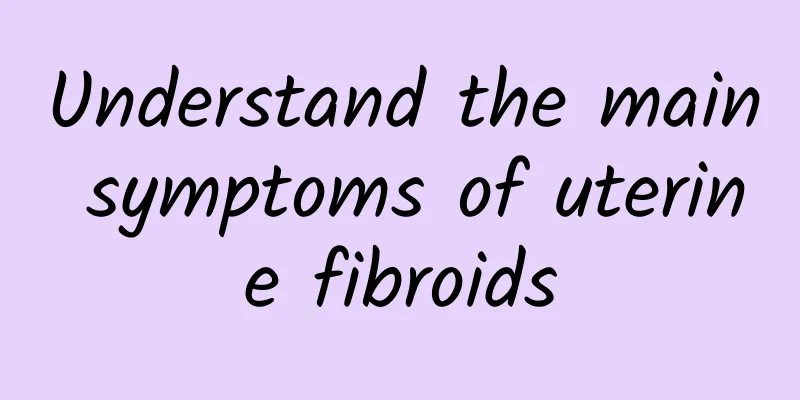There are 3 major types of headaches during menstruation. How to relieve headaches?

|
20% of women experience pain during menstruation, which is called premenstrual syndrome. It is mainly related to hormones in the body. During menstruation, a large amount of estrogen is secreted, which stimulates the secretion of prolactin. Prolactin stimulates the secretion of the prostate, thus causing menstrual pain. What are the three main symptoms of menstrual pain? 1. Typical migraine Typical migraines are prone to occur during menstruation, accompanied by symptoms such as eye pain, blurred vision, and emotional instability. After a few minutes, a headache will appear on one side, and the pain may be limited to a certain part of the head, or it may spread to half of the head. When the headache is severe, you will feel the blood vessels pulsating. Generally, the pain will last for more than ten hours, and in severe cases, it will last for several days. 2. Common migraine Common migraines usually occur during menstruation. When they occur, they will slowly worsen. The pain will be on one side or both sides. In severe cases, the pain will radiate to the entire head. 3. Cluster migraine Cluster migraine means that women suddenly experience headaches during menstruation. The headaches may occur multiple times a day and last for about half an hour. They are also accompanied by tears, nasal congestion, sweating, and eye socket swelling. Some patients also experience thickening and curvature of the scalp blood vessels. What are some tips for dealing with period headaches? 1. Keep your emotions under control During menstruation, women's emotions are unstable and they are prone to depression and irritability. These negative emotions will aggravate menstrual headaches, so you must adjust your lifestyle, learn to reduce stress, slow down the pace of life and study, and maintain a positive and optimistic attitude. 2. Drink sweet drinks appropriately When you have a headache during menstruation, you can drink a glass of sweet fruit juice. The sugar contained in it can increase the blood sugar content in the body, increase the blood flow in the body, and thus improve the condition of cerebral ischemia. 3. Soak your feet in ginger Soaking your feet in ginger can effectively promote blood circulation. Ginger also has the effect of dispelling cold. Put three slices of ginger in a wooden barrel and pour 42°C warm water into it and soak for 30 minutes until your back sweats. This can relieve the nerves, promote blood circulation, and improve sleep and prevent headaches. Kind tips During menstruation, women can do some exercise to relieve stress and tension. If you have severe pain, try not to exercise. If you wash your hair during menstruation, you should use a hair dryer to dry it immediately. Do not wash your hair at night. Do not go out immediately after washing your hair to prevent catching a cold. |
<<: How to induce menstruation? Share 6 common methods to induce menstruation
>>: How to regulate long menstruation? Super detailed regulation method
Recommend
How to identify cervicitis from symptoms? What are the folk remedies for cervicitis?
How to identify cervicitis from symptoms? What ar...
What are the symptoms of adnexitis?
What are the symptoms of adnexitis? Adnexitis is ...
How to treat cervical hypertrophy
Cervical hypertrophy is a type of chronic cervici...
How are cervical warts contagious?
Cervical warts are familiar to some people, but t...
Experts introduce common diagnostic methods for pelvic inflammatory disease
Pelvic inflammatory disease is a very common gyne...
The obvious pain after abortion should not be underestimated
Artificial abortion is a means of artificially in...
Sweet potato leaves are very effective in protecting the liver and detoxifying. Which is healthier, boiled or fried?
People often suffer from insomnia due to stress, ...
Which medicine is better for uterine fibroid bleeding, Chinese medicine or Western medicine?
When the amount of bleeding from uterine fibroids...
Prevent menopausal obesity by testing your physical fitness and exercising more
"Middle-aged obesity" is a problem for ...
Losing weight is not just about eating the right foods, adjusting the order of your diet is even more critical! Stabilize blood sugar after meals and avoid obesity
If you want to lose weight easily, in addition to...
Experts introduce the main symptoms of acute adnexitis
Acute adnexitis is a gynecological inflammation t...
How often do menarches occur?
Is menarche common? Generally speaking, the amoun...
Experts briefly analyze the causes of secondary dysmenorrhea
Although the number of patients with secondary dy...
Can threatened miscarriage be prevented?
Many women want to know if threatened abortion ca...
When should uterine fibroid surgery be performed? How big a uterine mass is required for surgery?
When to perform uterine fibroid surgery Uterine f...









